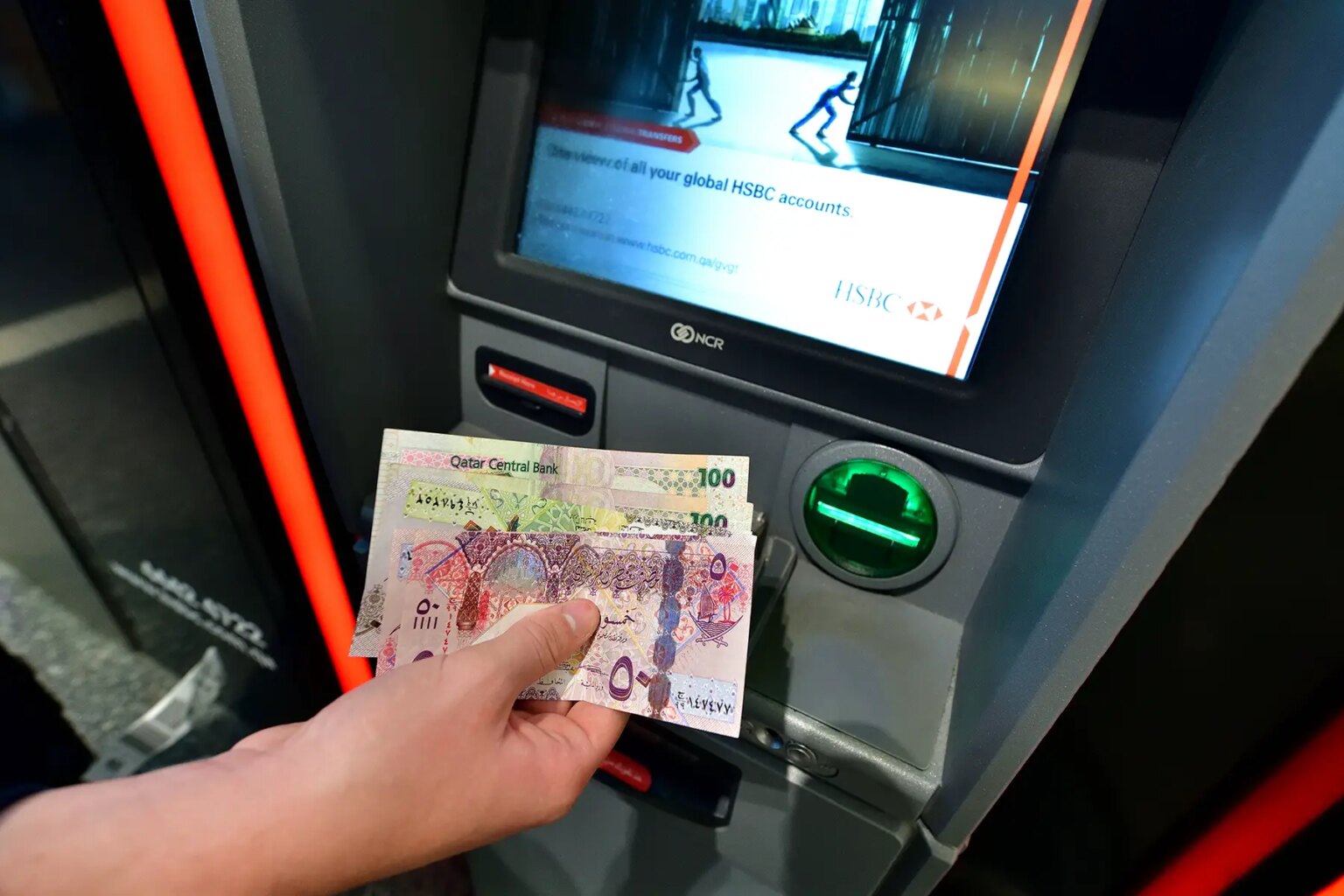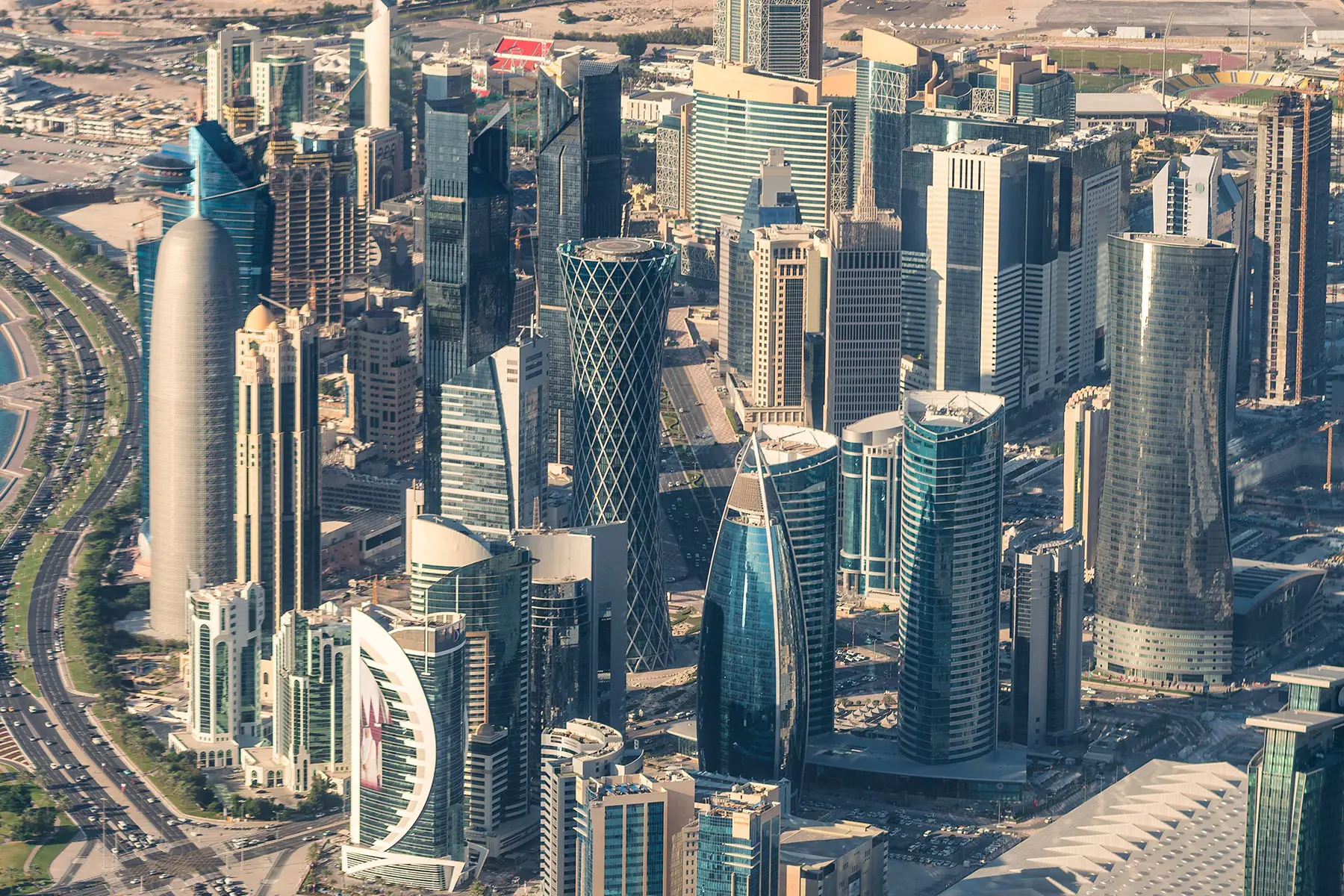The guide provides the following essential banking information you need to know:
- The banking system in Qatar
- Currency in Qatar
- Banks in Qatar
- Banking services in Qatar
- Opening a bank account in Qatar
- Payment methods in Qatar
- International money transfers
- Banking fees in Qatar
- Offshore banking in Qatar
- Banking security and fraud in Qatar
- Making a complaint about banks in Qatar
- Alternatives to using banks in Qatar
- Useful resources
The banking system in Qatar
Over the past few decades, Qatar has experienced impressive economic growth due largely to revenues generated from natural gas and oil reserves. For this reason, the country has been improving its financial and banking system to be more efficient and secure for its citizens.

Following the introduction of Qatar’s new Wage Protection System in 2015, all expatriates working there must have a local bank account (read more about opening a bank account in Qatar). Fortunately, though, the country has a well-maintained network of local and international banks and, in general, expats find that banking in the country is easy. If you are moving to Qatar, it is a good idea to familiarize yourself with the new banking system procedures to ensure a smooth transition.
Financial and banking system
Qatar Central Bank is the bank of government and the monetary authority of Qatar’s banking and financial system. It is responsible for formulating and implementing policies that are primarily concerned with the stability of the economy and the avoidance of financial imbalances.
As the Qatari economy has witnessed huge progress in recent decades – supported by the government policy based on the free market principle – Qatar has developed an extremely efficient, robust, and secure banking and financial system to protect the interests of the country. Despite growing at a fast pace, in terms of the volume of the market, the Qatar banking system is still small compared to other countries.
Banks play a central role in supporting economic development, by providing loans and financial services. In addition, Qatari authorities support domestic banks with direct investments, where necessary.
Commercial banks
According to the Ministry of Foreign Affairs website, 20 commercial banks are currently operating in Qatar: 12 national banks (four of which are Islamic) and eight international banks. They operate through 223 local branches, and Qatar Central Bank supervises them all.
Currency in Qatar
The Qatari riyal (QAR) is the local currency, with 100 dirhams making up one riyal. There are six riyal banknote denominations: QAR 1, 5, 10, 50, 100, and 500. The coins are available in denominations of 1, 5, 10, 25, and 50 dirhams.
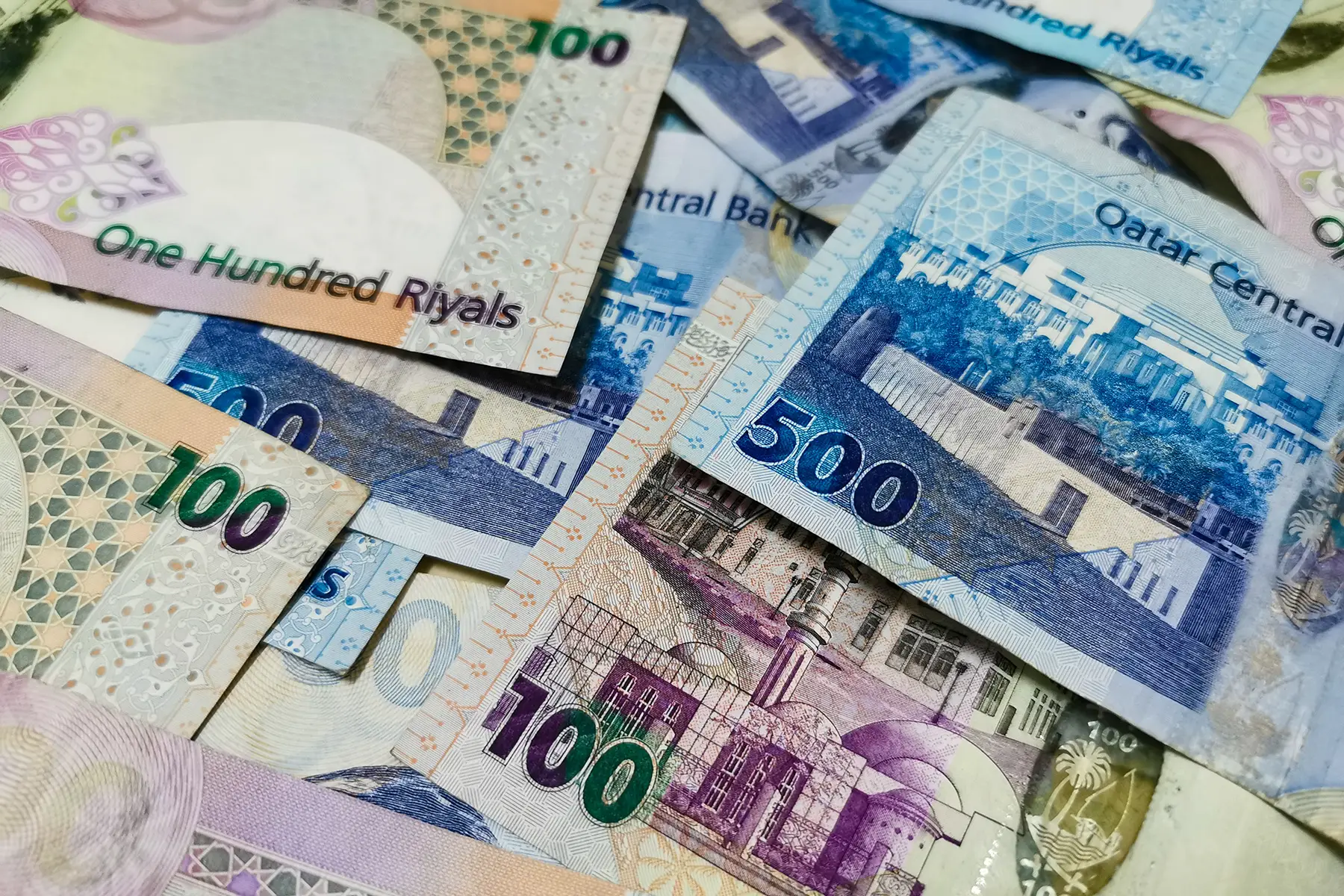
At the time of writing (September 2019), Qatari riyal was pegged to the US dollar at a rate of 1 USD to 3.64 QAR. While the exchange rate for the Euro (EUR) was 1 EUR to 4.01 QAR; the British Pound was 1 GBP to 4.52 QAR.
You can find the Qatari currency exchange rate on the Qatar Central Bank website, which posts the daily Qatari riyal exchange rate for several currencies.
Cash machines and ATMs in Qatar
There are a large number of ATMs throughout Qatar, especially in the major towns and cities. At Doha airport, you can not only withdraw Qatari riyals, but also euros, US dollars, and UAE dirhams. You can also use ATM locator apps to find the nearest one to you.
Most ATMs operate 24/7 (not always guaranteed) and accept both national and international cards. However, if you are using an ATM operated by banks other than your own, you may be charged a small fee. The fee isn’t levied by the ATM, it is instead charged by your bank, and it may vary (check your terms and conditions). Many ATMs offer instructions in both Arabic and English.
Banks in Qatar
You will find many options when it comes to local and international banks to serve your everyday needs in Qatar. All the commercial banks – such as Doha Bank, Qatar Islamic Bank, International Bank of Qatar, and the Qatar National Bank (QNB) – are regulated by the Qatar Central Bank.
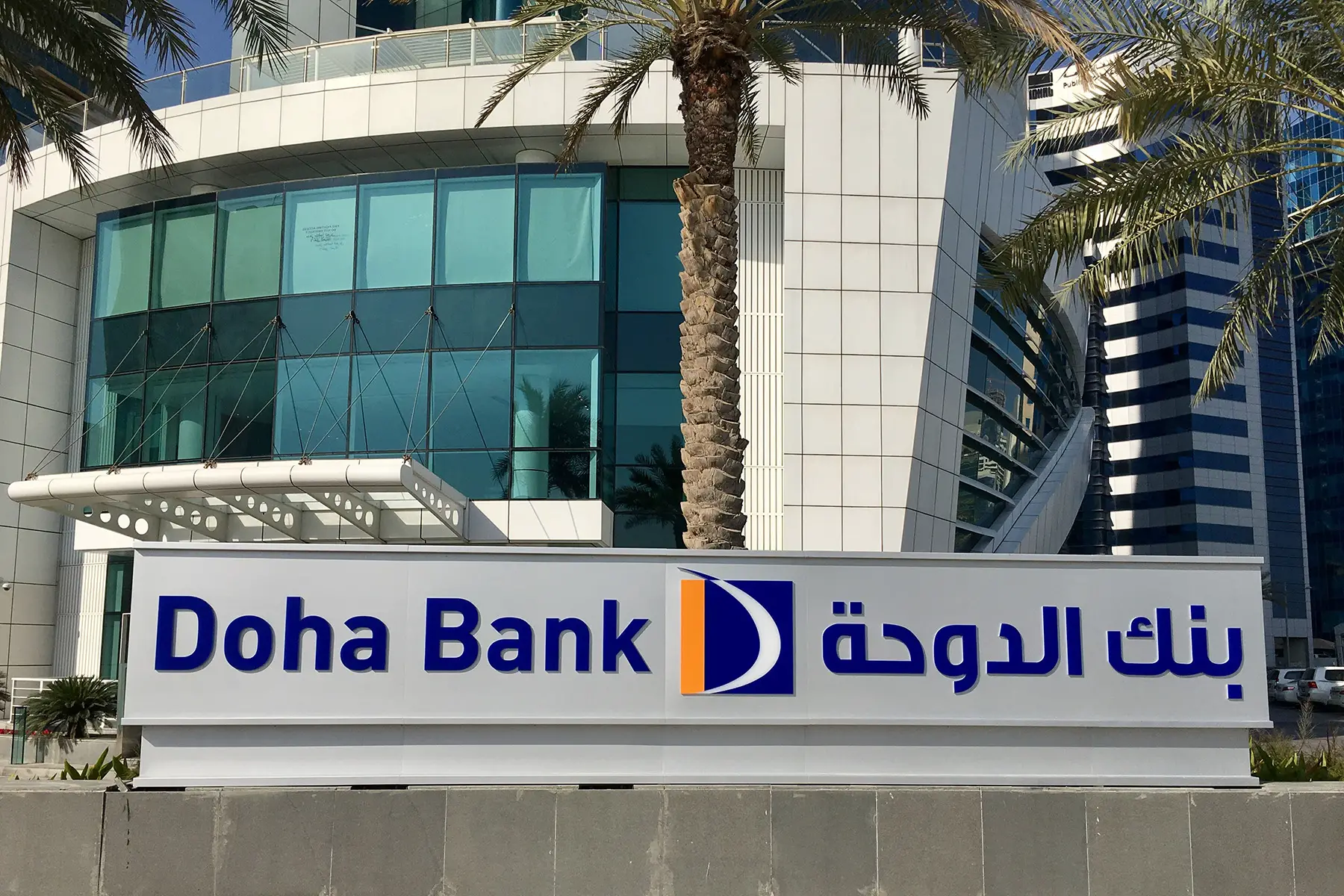
Alternatively, if you prefer to open an international account, you will find also some foreign banks – such as HSBC and Standard Chartered Bank – which are widely established in the country. This kind of account is an option for those who already have an account with one of the service providers in their home country.
National banks in Qatar
The major commercial banks in Qatar include:
- Ahli Bank
- Commercial Bank of Qatar: the largest private bank of Qatar
- Doha Bank
- Qatar Development Bank
- Qatar National Bank (QNB): the largest commercial bank in Qatar and also the largest financial institution in the Middle East
Islamic banks in Qatar
Islamic banking institutions are based on the principles of Sharia (Islamic law). Since 2011, only Sharia-compliant banks can offer Islamic banking services, but both Muslims and non-Muslims can have access to them. The Islamic banks in Qatar are:
- Barwa Bank: established in 2008, it is the youngest Islamic bank in Qatar
- Masraf Al Rayan: the second-largest Islamic bank in Qatar
- Qatar International Islamic Bank (QIIB): a privately owned Islamic bank
- Qatar Islamic Bank (QIB): the largest Islamic bank in Qatar and the second-largest bank in the country by assets
International banks in Qatar
The eight foreign banks operating in Qatar are:
- Bank Saderat Iran
- Barclays Bank
- BNP Paribas
- HSBC Bank Middle East
- Mashreq Bank
- Standard Chartered Bank
- United Bank Limited
Opening hours
In general, banks in Qatar are open from 7:30 to 13:00 – Sunday to Thursday. However, some banks – such as HSBC, and some QNB and Al Sadd branches in the city center in Doha – are also open on Fridays and Saturdays. The banks in shopping malls have more flexible hours and are often open from 10:00 until 22:00.
General information on banks
It is possible to open a bank account before you arrive in Qatar by filling in an online application. However, you will need to provide further documentation – in person – at the bank no later than 90 days after you arrive.
Usually, people open their bank account at the same bank that their employers use, because the money lands in the account on the same day when transferred. However, you won’t be charged if you decide to transfer your salary to another bank.
In general, there is not much difference between bank services. Standard banking facilities, such as current and savings accounts, internet banking, and debit and credit cards, are available at most banks.
You can easily find ATMs throughout the country (at shopping malls, petrol stations, supermarkets, and so on) and all major credit cards are accepted. It is important to note that most local banks offer services and information in both Arabic and English.
Banking services in Qatar
Expats in Qatar have several options to choose from when it comes to local and international banks. The range of services provided by Qatari banks is large and includes the following.
Types of bank accounts
- Current accounts: This kind of account is used for everyday banking, and its paid interest rates are generally low. Generally, they don’t have monthly fees, as long as a minimum balance is maintained (around 3,000 QAR). Some banks offer unlimited transactions.
- Savings accounts: Typically, savings accounts pay a higher rate of interest than current accounts, but lower than fixed deposit accounts. It is easy to withdraw from savings accounts, but your bank may only allow you a maximum number of withdrawals each month – after which it will probably charge a fee. Most savings accounts require a minimum balance of around 5,000 QAR.
- Fixed deposit account: This account is mainly for long-term saving and usually offers interest rates higher than either current or savings accounts. These accounts require a minimum account balance of approximately 20,000 QAR. You may not have access to your money until this account matures. You can open savings or deposit accounts with any retail bank in Qatar.
- Overdrafts: before you write a check in Qatar, you must ensure that you have adequate funds in your account because issuing a check without them is considered a serious criminal offense. Unauthorized overdrafts attract substantial penalty charges. Prosecutions are common and punishments can be harsh, including prison terms.
Investments and loans
- Mortgages: Expats can apply for a mortgage in Qatar, despite the rigid requirements. However, Qatar has been changing this and encouraging foreign investment in designated properties. The Commercial Bank of Qatar, Doha Bank, and HSBC are some of the banks that offer mortgages to expats in Qatar. To get these loans, however, you must hold property in one of the designated areas where foreigners can buy a property. For non-national residents, the mortgage can cover up to 80% of the value of the property price (depending on which bank you choose).
- Investments: If you are willing to invest your money, there are a variety of assets to invest in such as shares, property, government, and corporate bonds or commodities like gold. However, as an expat, you should be aware that investments will bring tax liabilities. It is also important to note that the Qatari riyal is pegged to the US dollar. We strongly recommend taking advice from a specialist tax adviser.
- Loans: Most Qatar banks offer personal loans for expats. However, each bank has its own guidelines and rules, such as the minimum basic salary required, interest rates, salary transfer, and other conditions. Interest rates are different for different types of loans. Many loan installments are fixed over the loan tenure, which allows you to manage your fixed monthly repayments.
Note that personal loan policies change frequently depending on the business requirement of banks in Qatar. Check your bank guidelines for more information.
Types of banking
- Digital/online banking: Qatar’s banks offer innovative electronic banking services that are among the most advanced in the world, including full-service internet and mobile banking, contactless payment by mobile, and numerous merchant electronic payment technologies. Most banks offer a simplified registration procedure for these services. It is not necessary to go to the branch to register if you have a debit card.
- Mobile banking: Many banks provide mobile banking for customers, and it can be done through the app, which is available for all devices and downloadable from any app store.
- Business banking: All the largest banks in Qatar offer a specialized business account. But before opening your corporate bank account, you will need to acquire your Commercial Residence (CR) – a document that states that you have a legal company – and pay all the respective fees.
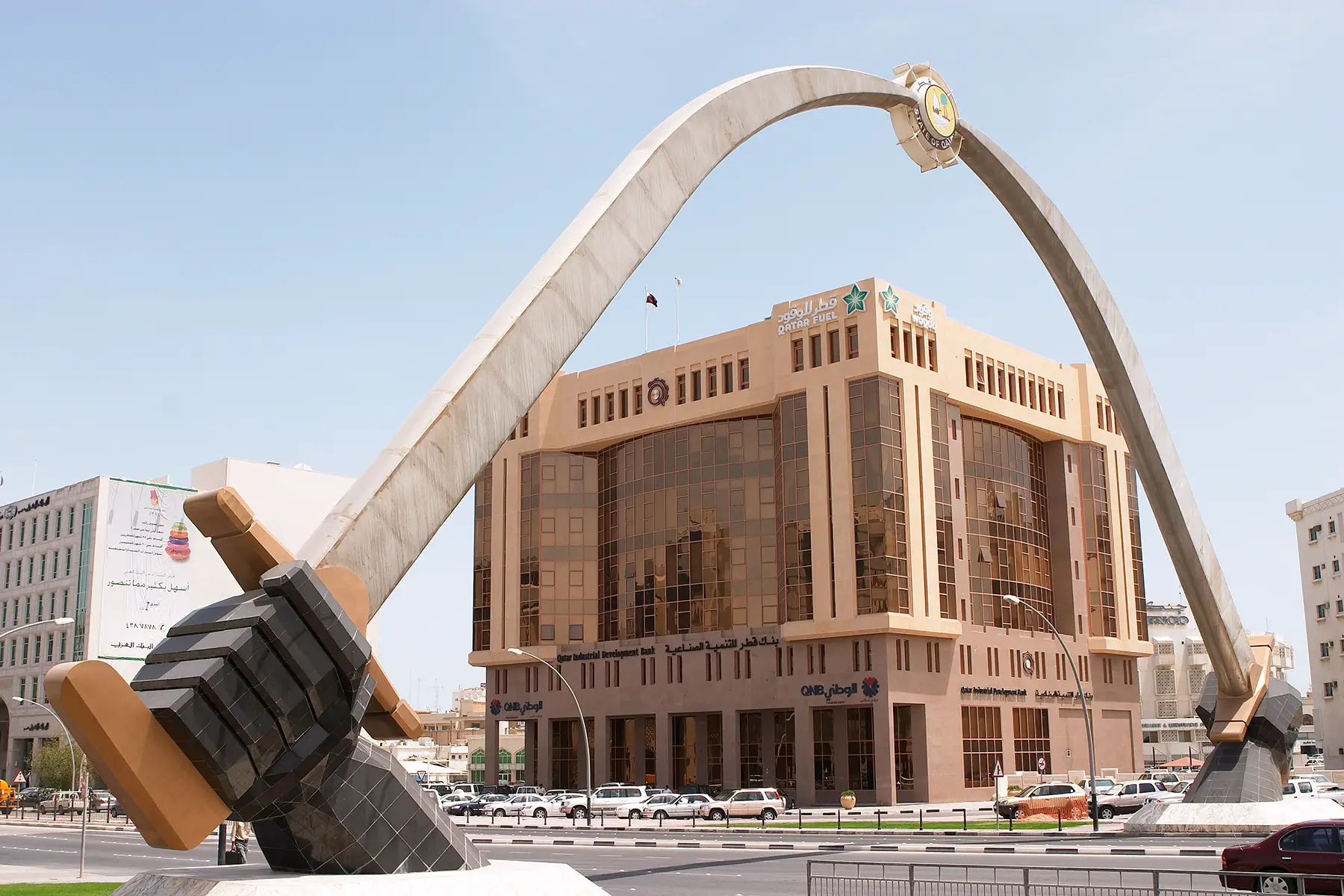
Additional services
- Insurance: Insurance services cover risks like health, natural accidents, property, business, and so on. Demand for insurance has been increasing, especially in times of economic activities in which risk and loss rates have hit high levels. The insurance sector in Qatar is considered one of the most important components of the financial and banking system.
- Expat services: Many banks offer special accounts for expats. In some banks, expats can open savings accounts designed for major foreign currencies, such as US dollars and pounds sterling.
Opening a bank account in Qatar
If you are moving to Qatar – working for a foreign or local company on a visa or starting your own business – you must open an account in a local bank. Since Qatar’s Wage system was introduced, all workers employed in the country must have salaries, bonuses, and wages paid into a Qatari bank account in Qatari riyals.
Opening a bank account in Qatar is relatively easy. Expats can apply online for a bank account before they arrive in the country. However, they should provide, in person, all the following documentation needed by the bank:
- a copy of their passport (personal information and visa pages);
- a copy of their residence and work permit;
- a ‘no objection’ letter from their employer, stating their monthly wage;
- two passport photos.
Once the application is approved, the bank will contact your employer, confirming that the account is ready to receive the salary payments.
Payment methods in Qatar
Cash
People generally use cash for everyday transactions in Qatar, and you can draw it out from ATMs. It is important to note that haggling is a cultural trait when you are making purchases in the Middle East. Sometimes you will be surcharged if you pay with a credit or debit card, particularly if you are buying from a small trader.
Check
Most banks give you a checkbook for free when you open a current account. However, check are not always accepted, and they are most likely used for house rental payments. Be aware that a bounced check is a serious criminal offense and the punishment can include jail time.
Debit cards
When you open a Qatari bank account, you will have access to a free debit card. Visa and Mastercard are the most common debit cards issued by banks in the country. These cards are used to make purchases, shop online, and withdraw cash.
Credit cards
Credit cards – mostly Visa and Mastercard – are widespread in Qatar, but you don’t get one immediately when you open a current account. First, you need to apply and give additional documentation to the bank. The annual fee for the credit card may vary depending on your credit limit, which is determined based on your salary.
Of course, you can also use your foreign card in Qatar, but this will be subject to currency fluctuation. It is also important to keep in mind that all credit cards with a magnetic stripe no not work and therefore you cannot make a transaction.
Due to the cash culture that remains in Qatar, it is not common for department stores to issue their own credit cards. However, credit cards are necessary to rent a car or book a hotel.
Direct debits and standing orders
People typically use direct debits and standing orders to pay utility bills. However, it is also possible to use these to settle loan payments and real estate installments, as well as taxes, employees’ salaries, and government payments such as subsidies, dividends, and subscriptions to institutions. To use these services, you need to access your internet banking and register the bill or service you want to schedule the payment for (one time or recurring).
Online and mobile payments
Nowadays, most consumers in Qatar rely on electronic payments: mobile applications, PayPal, and credit cards are popular in Qatar, and banks are increasingly improving their systems to make them safer for the user.
Prepaid cards are the most prevalent way for consumers to make purchases online. They account for 70% of the online payments market. Brands like Visa, MasterCard, American Express, and Discover are the most common credit cards for doing this. But there are also options like OneCard and MINT, which are popular prepaid cards for customers in the Middle East. Mobile payments are the second most popular type of payment (accounting for 19% of the online payment market), and Mobiamo is one of the main providers.

Local money transfers
Transferring money between local accounts is easy. If both accounts are from the same bank, the transfer will occur straight away and you will not have to pay a fee. However, if the accounts belong to different banks, it can take a little longer and you may have to pay transaction fees (refer to your bank standard charges for more details). You can transfer money online (using internet banking or mobile banking) or in one of the branches of your bank.
In general, before making a payment, you will need your bank account number, the receiver’s full name and IBAN, the bank’s name, and the purpose of the payment. If there are any missing details, the bank can cancel the transaction.
In Qatar, there is also a popular mobile wallet service called Ooredoo Mobile Money (OMM), that you can use to send money locally or abroad instantly through your phone. You can also deposit, withdraw, and pay DPS School fees, and much more.
International money transfers
All the largest banks in Qatar offer international money transfer services, but they may not be the best option because of the subpar exchange rates and expensive fees. In this case, a money transfer company can be a smarter choice, as you will get a better exchange rate, pay a smaller fee, and faster transaction times. Besides, these companies generally make transfers in almost every currency, even Qatari riyal. However, before using any transfer service, it is advisable to compare exchange rates and fees to find the cheapest option for your international money transfers.
The largest international money transfer companies used in Qatar are:
- CurrencyFair offers international money transfers to over 150 countries. They have exchange rates up to eight times cheaper than the banks, helping you avoid excessive bank fees;
- Wise is an international money transfer provider available in 59 countries that offers transfers between cross-border bank accounts up to eight times cheaper than traditional banks;
The processing time for an international money transfer depends on a range of factors, including the transfer provider you choose and where you send the funds. The transfer speed can vary from a few minutes to up to five days (the average speed is two days for transfer providers, but in some banks such as HSBC, it’s the same day).
Banking fees in Qatar
Typically, current accounts in Qatar are free of administration fees as long as you maintain a minimum account balance. However, you will have to pay a charge when you set up standing orders with other banks in Qatar or abroad; issue payment orders; replace damaged or additional cards; withdraw cash from ATMs outside of Qatar; pay annual credit card fees; or ask for a new checkbook. According to Sharia, charging interest is forbidden in Islamic institutions, so as a result there are fees for each type of service. Charges vary depending on the type of account and the bank, so you should research carefully all the charges before you open an account, particularly given that changing banks can be difficult and sometimes costs you money.
Overdraft
Never overdraw your bank account unless you have authorization from the bank. If it happens and the sum is small, your bank will probably pay the amount and inform you of the shortfall. However, it is possible that they will not honor the check if you are a new client or have a poor record with the bank. Always remember that, in Qatar, you will have to pay a substantial charge for an unauthorized overdraft, and the bank will question you about the incident. In addition to this, issuing a check without the necessary funds available in the account is a serious criminal offense in the region and punishments can be harsh.
Offshore banking in Qatar
An offshore bank account can be an important tool for an expat. Aside from extremely cheap money exchange fees or no fees at all, an offshore account has low taxes and, in most cases, offers a multi-currency debit card, which is perfect for a world citizen. Other benefits that an offshore account can offer are complete transactions in several different currencies; full access regardless of where in the world you are; and 24-hour access and assistance.
Some countries in the Middle East fall under tax-free jurisdictions, so it doesn’t make sense to move your money to an offshore account just to avoid paying taxes. However, in Qatar, your bank account is tied very closely to your employment status. So if you lose your job and have any loan or debt obligations, the local bank will freeze all your money up to the value of the debt and all lines of credit. It is important, therefore, to think about holding some funds offshore, under a different jurisdiction from your resident country.
Some banks provide offshore bank services, but the type of account might vary. In Qatar, you can find this service in the following banks: HSBC Qatar, PNB Paribas, and Standard Bank.
Banking security and fraud in Qatar
Most banks use industry-standard encryption techniques and hardware to protect unauthorized access to confidential information. The most common security measures to prevent fraud are passwords, SMS notification services, and security keys. Furthermore, since 2016, the biggest banks in Qatar have been implementing biometric technology, such as fingerprints and iris scanning, to increase security and allow customers to have PIN-free access to all accounts. The process to enroll is simple: the customer only needs to register his/her iris biometrics and take a digital photo of the iris at a branch of the bank.

How to protect yourself online
- Don’t give your account/internet banking password, PIN, or any personal information to anybody. Generally speaking, banks don’t ask you to do this;
- Create a secure password: never use the same password for internet banking and other websites;
- Update your computer, tablet, and smartphone system regularly and use anti-virus software to protect your devices.
Frauds and scams
As technology advances, scams have become more complex and people still fall victim to them. Despite being a safe country, cases of bank fraud – such as ATM card skimming and data and credit card theft – are on the rise in Qatar. However, the Qatari government doesn’t provide many details about it and keep the information under wraps. Therefore, it is important that people know about the most common scams and frauds.
These include the following:
- Fake calls from overseas or mobile operators such as Vodafone and Oooredoo. People often report having received missed calls from overseas (Senegal, Latvia, or Belarus) numbers from time to time. If the number is called back, premium rates are charged.
- Fake free gift vouchers or free gifts. People have reported receiving offers for free gift vouchers or free gifts from reputable brands such as Lulu Hypermarket, Carrefour, Starbucks, McDonald’s, H&M, and Next, to name a few, on social media. Your social media account may be compromised or hacked when you click on the link.
- Fake emails (US embassy e-mail, recruitment agencies, fine settlement, Qatar Airlines). These emails ask the person to click a link. The minute the recipient of the email clicks on the link, personal details are compromised and stolen by the scammer.
- The Ministry of Interior (MOI) warns all Qatar residents to be careful and not to share any personal information or banking details online. In case of being a victim of a scam or suspicious online activity, call (+974) 42347444 or 66815757 or send an email to [email protected]. The Communications Regulatory Authority urges residents to share their scam stories relating to mobiles, calls, or spam at [email protected].
Lost or stolen bank cards in Qatar
If you lose your bank card or someone steals it, you must report it immediately by telephone to the bank and confirm it in writing or in person. This is why it is important to keep the telephone number of your card company with you for quick notification. After you inform the bank of the loss, any checks written after that point will cease to be your responsibility. It is possible to stop the payment of a check, but you must persuade the bank that the cause is genuine and pressing.
Making a complaint about banks in Qatar
Qatar has an officially appointed banking ombudsman, which is affiliated with Qatar’s Central Bank. This is accessible to anyone who has a complaint against a bank and is in need of assistance. If you could not resolve your complaint through the bank’s ombudsman, the next step is to appeal to the Chamber of Commerce for advice, or to the Qatar Central Bank. The civil court can be your last resort, but this is rarely necessary.
Alternatives to using banks in Qatar
Those seeking an alternative to a bank in Qatar have the following options:
- Qatar Post: is an affordable and secure option for residents of Qatar to transfer money internationally. Together with the International Financial System (IFS) of Universal Post Union (UPU), they currently serve the following countries: Tunisia, Morocco, Djibouti, Mauritania, Philippines, Bangladesh, and Serbia. You can send money in local currency from any of our branches;
- Cash pick up transfer providers: through Western Union and MoneyGram; the two largest cash transfer networks in the world. It is possible to pick up cash at multiple locations throughout Qatar. However, money transfer companies usually charge high fees and offer less attractive exchange rates when you need quick transfers.
Useful resources
Government resources
- Qatar Central Bank
- Ministry of Foreign Affairs
- Hukoomi Official e-Government Portal
- Ministry of Interior (MOI)
Other resources
- Online Qatar: a list of official and useful websites
- Qatar Post
- Yalla Compare: a site where you can compare all types of bank services
